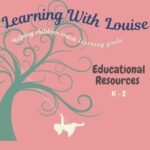By: Cindy Amos
The latest trend in education is the science of reading and laws are being passed to outlaw the cueing system method of teaching reading. Educators may be confused on what the change entails for them. If you’re like me, then you want to be giving your students the best research based instruction. Sometimes we need to quiet the politics of education and focus on the experts and their research findings.
For decades early childhood teachers have focused on the foundational skills that happen before a child learns to read. Many of these seem unimportant to outsides, but nothing could be further from the truth. Sparazani et al found that children who enter kindergarten not mastering language and literacy foundational skills would have academic difficulties.
What are the foundational skills?
Foundational skills are the precursors or building blocks for all other knowledge that leads to reading development. Most consider these the major categories that are encompassed in the foundational reading skills: Print Concepts, Phonological Awareness, Phonics, and Fluency. Without mastery of these skills students will struggle to master reading a text proficiently. Let’s break these categories down more.
Print Concepts:
- Understands print moves left to right
- Recognizes that words are made of a system of letters
- Identify and name all letters(capital and lowercase) of the alphabet
Phonological Awareness:
- Identify and produce rhymes
- Ability ot orally blend, pronounce and segment words into syllables
- Ability to orally blend the onset and rime in a word
- Tell the order of sounds in a word
- Add, delete, or substitute sounds to change one-syllable words
Phonics:
- Ability to use letter sounds to decode the sound of each consonant
- Ability to blend consonant-vowel-consonant sounds to make words
- Recognize the long and short sounds for the five major vowels
- Read common high-frequency words by sight
- Identify similarities and differences in words
Fluency:
- Orally read emergent-reader texts, maintaining an appropriate pace and using self connecting strategies while reading
Activities to help develop foundational skills.
There is a plethora of research on the topic but here are the basics. Children learn by play. In fact, Yopp & Yopp stated that playful language activities are most effective in helping a child develop phonemic awareness. Phonemic awareness instruction should be intentional to be effective. Omar & Axid found that multisensory experiences enhance memory and help students to master spelling and reading skills especially when it involves two or more senses; visual, auditory, kinesthetic. Reading stories that play with language like Wonkey Donkey, nursery rhymes or other stories can help a child to isolate the rhyming words. When teaching print concepts I have l like to place a star sticker in the corner of the page where writing should begin. This normally starts on a handwriting page to practice writing the child’s name. When talking about fluency, remember that each skill needs to be automatic for reading fluency to be optimal. While these are just a few activity ideas to help develop foundational reading skills, they are not the only ones.
How do you keep track of these skills for students?
I use a set of spreadsheets that I created to keep track of each of my students progress on foundational reading skills. At conference time, I can pull them out to help me explain the important skills a child has or needs to develop more before moving into reading words independently. Another plus to documenting as the year is progressing is the ability to pull up documentation if a child needs to be referred for additional help outside of the classroom. You can get the updated version of these recording sheets by clicking the link: Foundational Skills Checklists
I print these out and store one set per child in a binder with dividers. At the end of each week, I document each child’s progress or lack of mastery on their set. It was a game changer for my class last year.
Resources
Omar, M. & Azid, N., (2020). The effectiveness of CVC arm tapping interactive application towards year two students’ English language achievement, Universal Journal of Educational Research, 8(12),6517-6526.
Yopp, H., & Yopp, R., (2009). Phonological awareness is child’s play!, Young Children,64 (1), 12-18.
